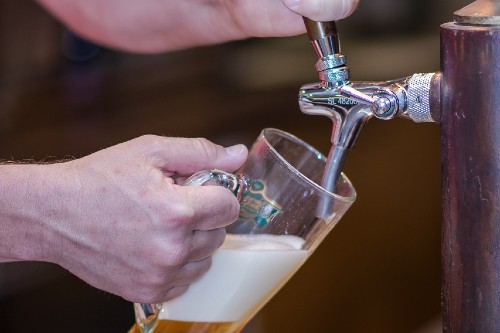Encouraging Demand: Nudging Public Interest in Alcohol-Free Draught Beers Holds Promise in Reducing Alcohol-Related Harms
Making alcohol-free beer more widely available on draught in pubs and bars may help people switch from alcoholic to alcohol-free beer, a new study published in Addiction today [21 March], has found. Pubs and bars taking part in the University of Bristol-led trial saw an increase in sales of healthier non-alcoholic draught beer.
In partnership with Bristol City Council (BCC), researchers from the University’s Tobacco and Alcohol Research Group (TARG) recruited 14 pubs and bars across the city that were willing to change the drinks that they offered on draught for a limited period. Previous research by the same group, using an online experiment as a proxy for real-world behaviour, showed that increasing the proportion of alcohol-free options make people more likely to select an alcohol-free drink over an alcoholic drink.
In the current study, the participating pubs and bars offered only alcoholic beer on draught for two weeks, and an alcohol-free option on draught for two weeks, and did this twice (over eight weeks in total). The order in which this happened was randomised. The researchers measured the amount of alcoholic and alcohol-free beer sold, as well as the total monetary takings, across the different periods.
The researchers found that when an alcohol-free option was available the pubs and bars sold, on average, 29 litres less of alcoholic beer per week, equivalent to 51 pints and a five per cent reduction in sales. However, this was replaced by an equivalent increase in sales of alcohol-free beer, suggesting customers were simply selecting a different option. Importantly, there was no net impact on overall monetary takings, suggesting that the change wasn’t hurting the financial bottom line of the participating pubs and bars.
Even small changes in drinking behaviour could have an important public health benefit. A five per cent reduction in consumption, if scaled up over a larger number of pubs and bars, could substantially reduce the harms associated with alcohol.
The research team from Bristol’s TARG, said: “Although alcohol-free options have been available for a while in pubs and bars, they have not had the same visual prominence as alcoholic drinks and are rarely served on draught.
“Our study showed that providing front-of-bar draught non-alcoholic options could lead to some customers switching from alcoholic drinks. This does not restrict consumer choice, in fact it increases the options available to the customer, and at the same time could reduce population levels of alcohol consumption and improve public health.
“We’re grateful to Bristol Health Partners’ Drug and Alcohol HIT for providing a collaborative platform to work with the Council’s public health and night-time economy teams.”
Christina Gray, Director for Communities and Public Health at Bristol City Council, added: “As part of our drug and alcohol strategy, BCC looks to reduce the harms that can be caused by alcohol, while supporting people to change behaviour. This research demonstrates that increased availability of no and low alcohol options in hospitality settings encourages customers to switch to healthier options, but does not have a negative economic impact on the hospitality business. This enables customers to make healthier choices, whilst enjoying the positive benefits of community and socialisation that night time economy spaces provide across Bristol.”
The study was funded by the University of Bristol’s Medical Research Council Integrative Epidemiology Unit (MRC IEU), National Institute for Health and Care Research Bristol Biomedical Research Centre (NIHR Bristol BRC), Bristol Health Partners Drug and Alcohol Health Integration Team (grant recipient AA), and the Wellcome Trust-funded Behaviour Change by Design collaboration between the University of Bristol and the University of Cambridge.
The research team comprised Katie De-Loyde, Jennifer Ferrar, Joe Matthews, Olivia Maynard, Angela Attwood and Marcus Munafò at the University of Bristol; Mark Pilling, University of Cambridge; Gareth Hollands, University College London; Natasha Clarke, Bath Spa University, and Tiffany Wood and Carly Heath at Bristol City Council.

